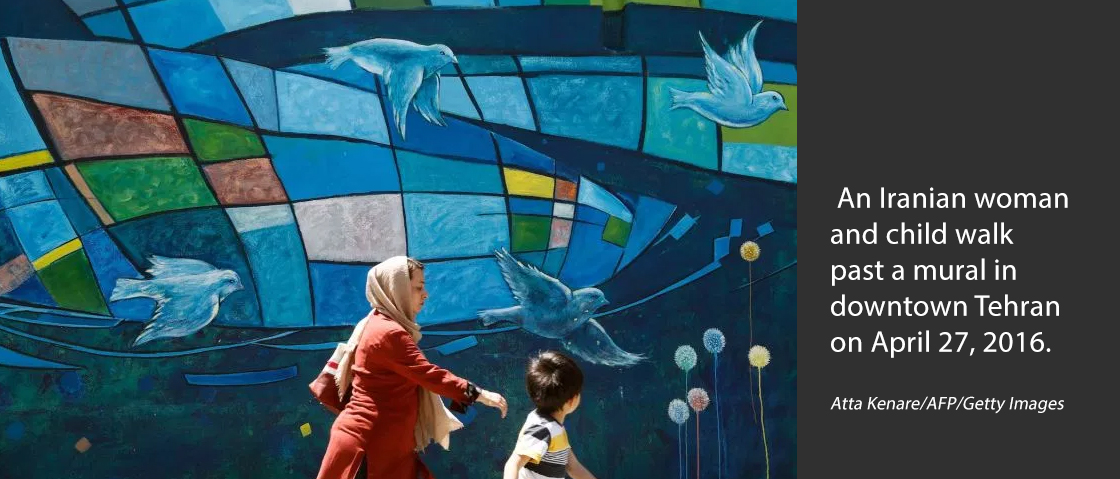For most in the country, Washington isn’t the archenemy—at least for now.
Since early May, the United States and Iran have been inching toward open conflict. On May 6, U.S. National Security Advisor John Bolton announced the deployment of an aircraft carrier and B-52 bombers to the Persian Gulf. After diplomatic volleys including Iranian threats to withdraw from the 2015 nuclear deal and a presidential Twitter reference to a potential “fight” with Iran, Tehran announced on Monday that it was quadrupling production of enriched uranium.
Most pundits and scholars agree that the Iranian government’s behavior is driven by an ever-present and overarching goal of regime survival. Less clear, however, is what the Iranian public thinks about this fight. Thanks to censorship and other limits on the data, Iranian public opinion, especially within the less cosmopolitan and regime-supporting sector of the populace, remains largely opaque to Western observers.
Our research, based on a 2015 survey of over 1,500 devout Iranians on pilgrimage to Karbala, Iraq, provides insight into the preferences of this largely unexamined sector of the population—a group that the study finds to be deeply supportive of the regime, fiercely defensive of Iran’s national autonomy, but by no means inherently antagonistic to the United States.
Nearly three-quarters of the sample voiced strong support for both the Iranian regime broadly and Supreme Leader Ali Khamenei specifically. They were even more supportive of Iran’s interventions across the Middle East, from Yemen to Iraq. Yet the respondents did not believe that Iran’s motivation for those battles was regional dominance, nor did they wish it to be so. When given four possible motivations for Iran’s foreign policy, nearly 40 percent of respondents argued that Iran acted primarily to ensure its own security, with around 10 percent believing that its goal was greater regional influence. This focus on security and survival was underscored by beliefs that Iran should focus on establishing economic self-sufficiency rather than global integration, likely a remnant of the many years of sanction-induced austerity.
Interest in national survival, however, was coupled with surprisingly robust support for collaboration with the United States on a range of issues. Nearly 65 percent of respondents supported or somewhat supported working with the United States to fight the Islamic State, as Iran did, and over 80 percent were supportive or somewhat supportive of the 2015 multiparty nuclear agreement.
Interest in national survival, however, was coupled with surprisingly robust support for collaboration with the United States on a range of issues.
Even in nonpolitical realms, over half of respondents supported more engagement with the United States, including talks on topics of mutual concern, increased access for journalists on both sides, and cultural, educational, and sports-related exchanges. Given that the sample was drawn from devout Iranians, who tend to be more supportive of the regime, support for interaction with the United States in the population as a whole is likely to be even higher.
Of course, respondents were not naive about Iran’s and the United States’ differing interests. Yet rather than viewing the United States as dangerous, most saw it as having little impact across conflicts ranging from Yemen to Iraq. They also preferred that the United States remain uninvolved in either humanitarian or security interventions in the Middle East.
The reticence toward U.S. involvement in the Middle East was unquestionably linked to a perception that Washington treats Iran unfairly, especially in comparison to Saudi Arabia and Israel. Whereas less than 20 percent of Iranians thought the United States was at all honest and fair with Iran, over 80 percent felt the country was at least somewhat honest and fair with Saudi Arabia and Israel.
These results indicate that even among regime supporters the United States is not seen as Iran’s archenemy, as political and scholarly rhetoric implies. Finally, they highlight the possibility of a souring relationship worsened by perceptions of unfair treatment.
When seen through this lens, Iran’s recent actions become more legible. Driven by a distrust of an increasingly erratic Washington, Tehran is likely motivated more by concerns about self-preservation than by aggression. On some levels, this is reassuring, indicating that unilateral or unprovoked aggression is unlikely. Yet the results also caution against erratic signals by the United States that might be perceived as a credible threat to the regime’s survival, which could serve as a catalyst for defensive action.
How the attitudes of Iran’s devout relate to those of the nation more broadly remains to be seen. But this group of regime-supporting Iranians are precisely those often credited with inspiring Tehran’s more geopolitically aggressive maneuvers. By understanding their motivations and interests, the United States can better understand what actions are most likely not only to trigger conflict but also to improve bilateral relations.




